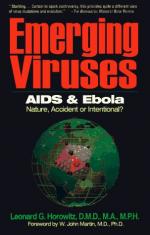|
This section contains 494 words (approx. 2 pages at 300 words per page) |

|
Ebola virus is the name given to several strains of virus that cause human hemorrhagic fever. The name "Ebola" comes from the Ebola River in Zaire, Africa, where the virus was first identified. Ebola infection begins suddenly with a fever, and progresses with the destruction of vital organs such as the liver and kidneys. It usually leads to massive internal bleeding followed by death. The incubation period, time from exposure to onset, for Ebola is five to ten days, and it runs its course is about seven to ten days. The virus kills 50-80% of its victims. Scientists cannot not explain why some people survive the disease. Neither do they have any drugs to treat it or vaccines to prevent it.
The first identification of Ebola virus occurred in 1976 with outbreaks in Zaire and the Sudan which are 375 mi (604 km) apart. Of the 550 people that contracted...
|
This section contains 494 words (approx. 2 pages at 300 words per page) |

|


